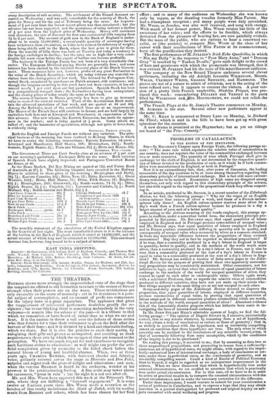THE THEATRES.
NOTHING shows more strongly the impoverished state of the stage than the temptations offered to old favourites to return to the scenes of former triumph when their powers are on the wane. These revisitations are only excusable on the score of necessity : art in its decadence is a pain- ful subject of contemplation, and no amount of profit can compensate for the injury done to a great reputation. The applauses that greet the reappearance of celebrated performers doubtless gratify the re- cipients ; but to our thinking there is something melancholy in the very welcome—it sounds like the echoes of the past—it is a tribute to that which we remember, or have heard of, rather than to what we see and hear, It is the custom to throw a veil over the defects of those artists who thus forsake for a time their retirement to glean the field after the harvest of their fame ; and it is dictated by a kind and charitable feeling, which we share. But it is also the practice to exalt their merits, by eulogizing their gifts and graces as unimpaired, and extolling as fresh acquirements those arts by which the ravages of time are lessened to the perception. We have too much respect for real excellence to recognize such factitious claims to admiration : as well might one prefer the arti- ficial complexion given by cosmetics to the faded cheek before the natural bloom of young and healthful charms. When, two or three years ago, CHARLES KEMBLE, with furrowed cheeks and faltering voice, gallantly tottered acress the stage as Merolla° and Don Felix, surprise and regret took the place of delight and admiration ; and now, when the veteran BRAMAN is heard in the orchestra, wonder at his prowess is the predominating feeling. A fine artist may tower above his successors, "great in ruin "; but the sight is a sad one after all.
Mr. and Mrs. Woon have appeared this week at the Princess's The- atre, where they are fulfilling a "farewell engagement." It is some twelve or fourtaen years since Mrs. WOOD made a sensation as the heroine of that trashy melodrama the Maid of Judah, with its medley music from Rossua and others, which has been chosen for her final effort ; and to many of the audience on Wednesday she was known only by repute, as the dazzling vocalist formerly Miss P.sTost. She had a triumphant reception ; and many people were duly astonished. Mr. WOOD, as Ivanhoe, was also well received, and sang with energy. With much of her former power, Mrs. WOOD retains but little of the sweetness of her voice ; and the efforts to be forcible, which always detracted from the pleasure of hearing her, are now painfully evident. But the mass of the public, who are curious to hear a renowned vo- calist, or (the seniors) to compare Mrs. WOOD at the close of her career with their recollections of Miss PAToti at its commencement, have all the gratification they desired. The first performance of M. Jramint's Irish Echo Quadrilles, in which " Nix my Dolly" is the response to "Poor Mary Anne," and "Duncan Gray" is mocked by "Yankee Doodle," gave such delight to the crowd of hats and greatcoats with which the promenade was thronged, that it was evident M. JIILLIEN had hit the taste of his miscellaneous audience.
The company at the New Strand Theatre embraces several clever performers, including the old Adelphi favourite WILKINSON, Messrs. WIGAN, CLEMENT WHITE, GEORGE BENNETT, and HAMMOND. The pieces are not of a nature to admit of criticism, nor is the acting of the most refined sort ; but it appears to content the visiters. A poor ver- sion of a pretty little French vaudeville, Made/on Friquet, was pro- duced this week : remembering Di.TAZET and VERNET in the parts filled by WILKINSON andjars. MONTGOMERY, we could not relish the performance. The French Plays at the St. James's Theatre commence on Monday. M. ACHARD is the star. Several other new performers appear at the same time.
Mr. C. KEAN is announced at Drury Lane on Monday, in Richard the Third; which is said in the bills to have been got up with great splendour for the occasion.
A new drama is promised at the Haymarket ; but as yet no tidings are heard of "the Prize Comedy."


























 Previous page
Previous page